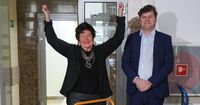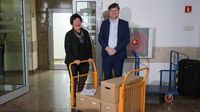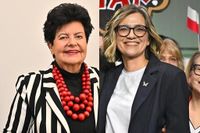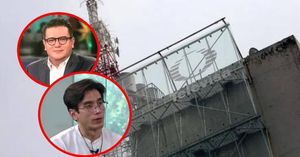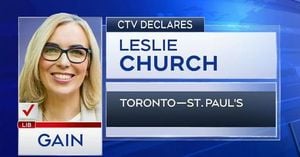On March 27, 2025, Joanna Senyszyn, a prominent economist and former Member of the European Parliament, made a significant move in her bid for the Polish presidency by delivering 150,000 signatures of support to the National Electoral Commission (PKW). This substantial number of signatures not only showcases her grassroots appeal but also emphasizes her commitment to providing voters with an independent choice in the upcoming elections.
Speaking to reporters outside the PKW headquarters, Senyszyn articulated her vision for Poland, stating, "Poland needs a choice and an independent president." She expressed her belief that the electorate is eager for a candidate who does not align with party politics, asserting, "Most do not want another party functionary in the Presidential Palace. I am an independent candidate, but even when I was a party member, I always demonstrated independence. This is what I am known for. I do not change my views."
Senyszyn, who holds the title of professor of economics, highlighted the importance of economic knowledge in the role of the president. "It is crucial for the president to understand the implications that signed laws will have on the economy and the wallets of citizens," she emphasized. This focus on economic expertise sets her apart from many of her opponents, who she noted are often political scientists or historians.
Her campaign team is optimistic about securing even more support, anticipating at least 10,000 additional signatures by the upcoming Friday. Senyszyn's candidacy has already sparked a notable response from the public, which she described as a "common movement." She remarked, "Hundreds, if not more, have approached me, expressing joy that I am running and offering to help gather signatures."
As of now, the National Electoral Commission has registered seven presidential candidates, including Sławomir Mentzen, Grzegorz Braun, and Rafał Trzaskowski, among others. The deadline for submitting candidacies is April 4, 2025, at 4 PM, with the presidential election scheduled for May 18, 2025, and a potential second round on June 1, 2025.
Senyszyn's entry into the race adds a unique dynamic to the election landscape. In a political environment where many candidates are vying for the presidency, her academic credentials and independent stance may resonate with voters disillusioned by traditional party politics. She pointed out that the current candidates are often focused on issues like inflation and healthcare, which, while important, do not encompass the full range of presidential responsibilities, particularly in defense and foreign policy.
In her address, Senyszyn also reflected on her past political experiences, noting that her previous attempts to run for office faced challenges, including a rejection from the Electoral Commission due to signature discrepancies. This time, she has taken extra precautions, ensuring that her campaign submitted a robust number of signatures to meet the requirements set by the PKW.
In a broader context, the upcoming election will see a notable presence of female candidates, with Magdalena Biejat from the Left also having surpassed the 100,000 signature threshold. Biejat's campaign collected an impressive 419,000 signatures, indicating strong organizational support and public enthusiasm. She has encouraged voters to cast their ballots according to their convictions, emphasizing that there is no such thing as a "wasted vote" in the first round of elections.
Both women represent different facets of the political spectrum, with Biejat embodying a newer generation of leftist politicians focused on social issues, while Senyszyn offers a more traditional, academically grounded approach. The simultaneous candidacies of these two prominent figures from the left could either divide the vote or mobilize a broader coalition of supporters, depending on how their campaigns evolve in the coming weeks.
As the election date approaches, the political landscape in Poland is shaping up to be competitive and multifaceted, with voters facing a diverse array of candidates and platforms. The significance of economic policy, social justice, and independent leadership will undoubtedly play pivotal roles in shaping the outcome of this presidential race.
In conclusion, Joanna Senyszyn's candidacy not only introduces a strong independent voice into the presidential race but also reflects a growing demand among Polish citizens for knowledgeable leadership that prioritizes economic understanding and independence from party politics. As the campaign progresses, it will be interesting to see how her message resonates with the electorate and whether she can translate her academic credentials into political success.
